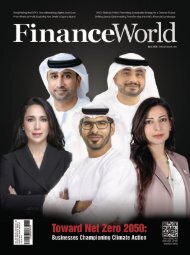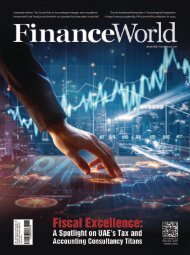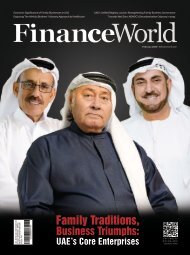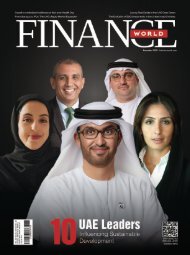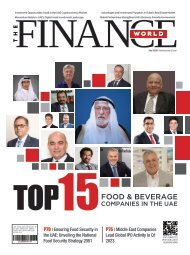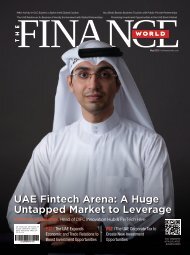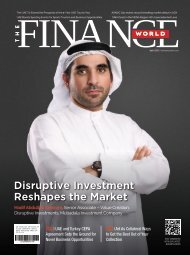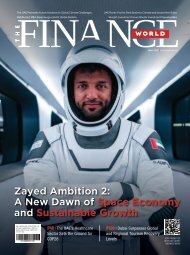The Finance World Magazine| Edition: September 2023
The Middle East is currently experiencing a transformative era characterized by sustainability and governance, known as the Middle East's Green Renaissance. At the heart of this movement is the Environmental, Social, and Governance (ESG) framework, which is reshaping corporate success by placing a strong emphasis on transparency, accountability, and responsible global citizenship. ESG investing is reshaping financial markets, aligning financial gains with societal and environmental impacts. The Middle East has pledged significant net-zero commitments, underscoring its commitment to environmental stewardship. As the Middle East prepares to host COP28 in Dubai, it remains committed to sustainability. This edition explores the Middle East's ESG journey, from milestones to future horizons. This edition provides insightful perspectives across diverse sectors within the UAE. it provides insights on certain areas of focus, such as The Key to Mitigating Risks in Stock Market Portfolios, Cross-Border M&A: Challenges and Opportunities in Global Transactions, Risk Management Best Practices for Ensuring Business Continuity, Fintech Innovations Shaping the Future, and many more articles that offer critical analysis and insights on current trends and issues in the business and investment domains. Keep yourself up to date with all financial sector news with our current news segments. Each person can find something unique from us. We believe our readers deserve real value from what we have to offer.
The Middle East is currently experiencing a transformative era characterized by sustainability and governance, known as the Middle East's Green Renaissance. At the heart of this movement is the Environmental, Social, and Governance (ESG) framework, which is reshaping corporate success by placing a strong emphasis on transparency, accountability, and responsible global citizenship.
ESG investing is reshaping financial markets, aligning financial gains with societal and environmental impacts. The Middle East has pledged significant net-zero commitments, underscoring its commitment to environmental stewardship.
As the Middle East prepares to host COP28 in Dubai, it remains committed to sustainability. This edition explores the Middle East's ESG journey, from milestones to future horizons.
This edition provides insightful perspectives across diverse sectors within the UAE. it provides insights on certain areas of focus, such as The Key to Mitigating Risks in Stock Market Portfolios, Cross-Border M&A: Challenges and Opportunities in Global Transactions, Risk Management Best Practices for Ensuring Business Continuity, Fintech Innovations Shaping the Future, and many more articles that offer critical analysis and insights on current trends and issues in the business and investment domains.
Keep yourself up to date with all financial sector news with our current news segments. Each person can find something unique from us. We believe our readers deserve real value from what we have to offer.
Create successful ePaper yourself
Turn your PDF publications into a flip-book with our unique Google optimized e-Paper software.
Minimize real estate risk, embrace<br />
opportunity: Diversify, leverage wisely, stay<br />
informed, manage assets proactively, and<br />
build reserves to conquer market volatility.<br />
Diversification is a time-tested<br />
strategy that can help reduce<br />
risk in any investment<br />
portfolio, and real estate<br />
is no exception. By spreading your<br />
investments across various types of<br />
properties in different locations, you<br />
can mitigate the impact of market volatility<br />
in any single region or sector. For<br />
example, owning a mix of residential,<br />
commercial, and industrial properties<br />
in different cities or states can<br />
provide a more stable and balanced<br />
investment profile. Diversification<br />
allows you to capture the potential<br />
upside in different markets while also<br />
minimizing exposure to any specific<br />
market downturn.<br />
Leveraging debt to invest in real<br />
estate can enhance returns when the<br />
market is favorable, but it can also<br />
amplify losses during downturns. Overleveraging<br />
increases your exposure to<br />
interest rate fluctuations and may put<br />
you at risk of default if property values<br />
decline. To manage risk effectively,<br />
maintain a conservative approach to<br />
debt. Limit your loan-to-value ratio<br />
and ensure that your rental income<br />
covers mortgage payments comfortably.<br />
A well-calculated debt strategy<br />
will provide financial flexibility and<br />
a cushion during market downturns.<br />
Staying informed about market<br />
trends and economic conditions is<br />
crucial for any real estate investor.<br />
Regularly monitor local and national<br />
real estate data, economic indicators,<br />
and demographic trends. This information<br />
will help you anticipate potential<br />
shifts in the market and make well-informed<br />
decisions. Being proactive in<br />
monitoring market conditions allows<br />
you to adjust your investment strategy<br />
promptly, reducing the impact of market<br />
volatility on your portfolio.<br />
Property management plays a vital<br />
role in risk mitigation. Effective asset<br />
management helps minimize vacancies<br />
and ensures timely maintenance and<br />
repairs. Well-maintained properties<br />
are more likely to attract and retain<br />
tenants, providing a steady income<br />
stream even during uncertain market<br />
conditions. Additionally, proactively<br />
addressing repair issues can prevent<br />
potential larger problems, saving you<br />
time and money in the long run.<br />
Investing in Real Estate Investment<br />
Trusts (REITs) can be a viable strategy<br />
to hedge against market volatility.<br />
REITs are investment vehicles that<br />
pool capital from multiple investors<br />
to invest in a diversified portfolio of<br />
income-generating properties. <strong>The</strong>y<br />
provide exposure to the real estate<br />
market without direct ownership of<br />
physical properties. By diversifying<br />
your real estate holdings with REITs,<br />
you can spread risk across multiple<br />
properties and markets, further reducing<br />
the impact of market fluctuations<br />
on your overall portfolio.<br />
Maintaining sufficient cash reserves<br />
is a crucial risk management strategy<br />
in real estate financing. Economic<br />
downturns or unexpected property-related<br />
expenses can strain your cash<br />
flow, making it challenging to meet<br />
financial obligations. Having adequate<br />
reserves ensures that you can continue<br />
to hold your real estate assets during<br />
challenging times, avoid forced sales,<br />
and capitalize on opportunities when<br />
the market rebounds.<br />
Real estate investing offers significant<br />
potential for long-term wealth<br />
creation, but it also involves inherent<br />
risks, particularly when it comes to<br />
market volatility. Employing effective<br />
risk management strategies is essential<br />
for protecting your investments and<br />
minimizing the impact of market fluctuations.<br />
Diversification, prudent use<br />
of debt, continuous market research,<br />
proactive asset management, REIT<br />
investments, and building reserves are<br />
all integral components of a comprehensive<br />
risk management plan in real<br />
estate financing. By adopting these<br />
strategies, you can position yourself<br />
to weather market ups and downs<br />
while achieving sustainable success<br />
in the dynamic world of real estate<br />
investment.<br />
<strong>September</strong> <strong>2023</strong> www.thefinanceworld.com 53





